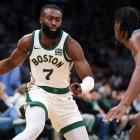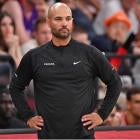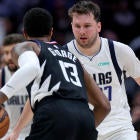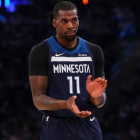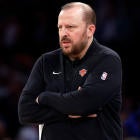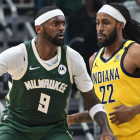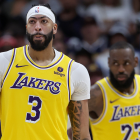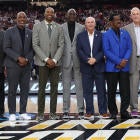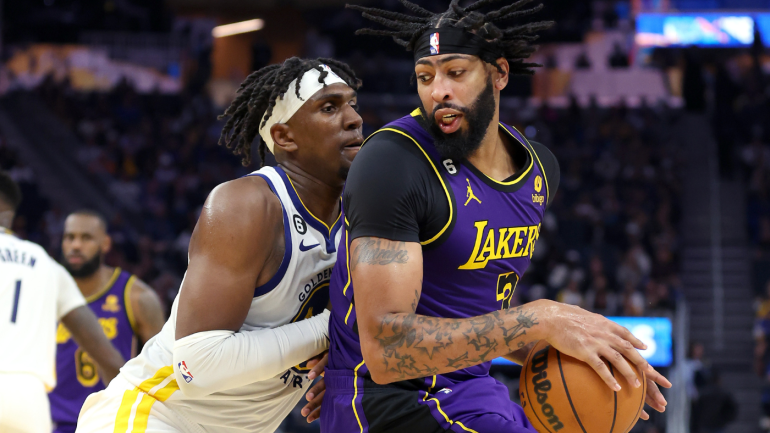
Arguably the most anticipated second-round series in playoff history, Lakers vs. Warriors, kicks off Tuesday night, and the marquee matchup is LeBron James vs. Stephen Curry, the two best players of a generation who square up for the fifth time in their playoff careers.
But the matchup that might well decide the series is Kevon Looney vs. Anthony Davis. Specifically for the Warriors, can Looney, the leading rebounder in the playoffs who topped 20 boards in three separate games against Sacramento (an NBA record since the merger), continue his dominance on the offensive glass against Davis, who is an equally hard O-board crasher?
Other than Curry's typical brilliance, Looney's offensive rebounding was the most pivotal factor in Golden State's first-round survival. And indeed, that's what it was. Survival. The Kings came at the Warriors with everything, and without the extra possessions and second-chance points created by Looney, Golden State is at home right now.
The rebounding battle will be a big deal in this series. Against Memphis, which was without Steven Adams and Brandon Clarke, the Lakers grabbed an offensive rebound on 29.3% of their misses, per Cleaning the Glass, which would have ranked as the third-highest mark in the league during the regular season. That led to 17.3 second-chance points per game, the second-highest mark among all playoff teams still alive.
The Warriors scored 16.1 second-chance points per game against Sacramento but gave up 17.3, which is to say, Looney's efforts merely kept them from drowning. It wasn't an advantage. That's Looney's mission against the Lakers. Cancel out Davis on the glass. Or come close. That's a lot easier said than done, and it will require more than Looney to pull off, but if the Warriors manage to do that, they should have a scoring edge in the remaining margins of this series.
One thing to watch for will be Steve Kerr's rotations with an eye toward Looney's impact. Kerr may decide to keep Looney on the court for as many non-Davis minutes as he can to give him a chance to work the boards against the Lakers' small lineups, which Darvin Ham utilized throughout the first round when Davis sat. Or, it could force Ham to cue up backup center Wenyen Gabriel, who was not in the rotation against Memphis.
Another key element to the Looney-Davis matchup is how the Warriors force Davis to defend outside the paint. Looney isn't a shooter, obviously, so the only way he can draw Davis out is by working the two-man games with Golden State's creators, namely Curry.
The Warriors are not a volume pick-and-roll team. It's been a break-in-case-of-emergency strategy over the years for Kerr, who prefers to keep everyone in motion and involved. But when it came down to it in Game 7 vs. Sacramento, the Warriors ran a total of 23 dribble-handoffs and pick-and-rolls (a series high) for Curry, who dribbled a total of 574 times (per Second Spectrum, via The Ringer's Kevin O'Connor), his most literal bounces of the ball since the first championship in 2015.
If Kerr continues to commit to a higher volume of these actions with the ball in Curry's hands and Davis' man as the screener/DHO deliveryman, there is simply no way for Davis to play the drop coverage that he played vs. Memphis, which doesn't have a shooter to burn that coverage. If Davis drops back into the paint with Curry coming off free for 3-pointers, it'll be curtains.
If it's Looney in the action, he can roll straight to the rim and be in position to offensive rebound with Davis preoccupied with switching onto or hedging against Curry. The Lakers will look to pre-switch some of this stuff to allow Davis to retreat before the action commences, but Golden State is so good at the impromptu stuff that I would expect a lot of DHOs on the fly with Looney and Draymond Green before the Lakers can preemptively adjust.
Green is probably the most instinctive screener/handoff guy in the league. His defender always sags back because he can't shoot, which means Green can pick Curry's man without a second defender there to step up into the shooting space.
When the Warriors go small with Green at the five, Davis will likely guard him as long as Golden State keeps four shooters out there. If Gary Payton II is out there, or Jonathan Kuminga (who I think gets dusted off and used in this series) and the Lakers try to hide Davis on the second non-shooter so that he can roam as a rim disruptor and crash the glass, Payton/Kuminga can become the screener.
The rub of the small lineups for Golden State is Davis can, in turn, kill them on the offensive glass on the other end. This will be a big part of the Ham-Kerr chess match. When does each team go small, and do they try to mirror one another's lineups or zag for stretches of size advantages?
Bottom line, the offensive-glass work of Looney and Davis is a huge factor in this series, and beyond that, the Warriors finding ways to pull Davis out of the paint to clear driving lanes is similarly vital. Looney is in position to factor heavily into both. His importance has become invaluable. He's been absolutely amazing. But Davis is a different animal, man. Can Looney match up? Can he have the same kind of impact that he had against Sacramento? Because again, that wasn't a bonus. It was a necessity. And it could be in this series, too.














